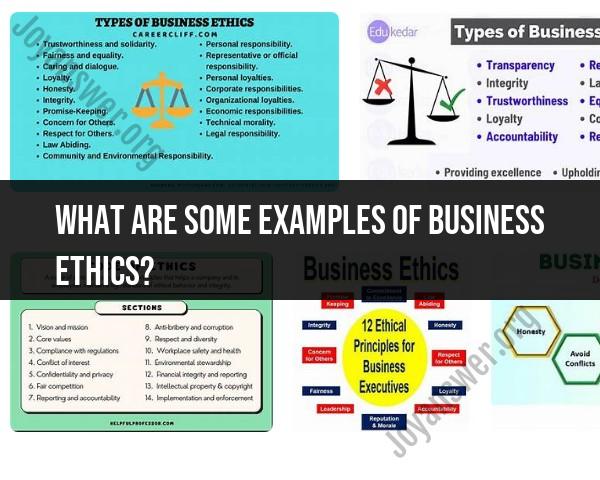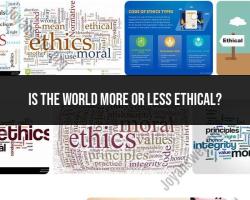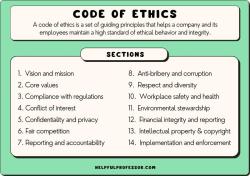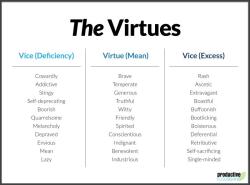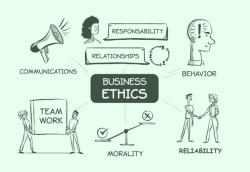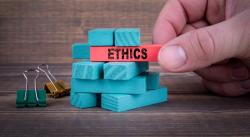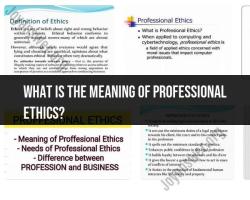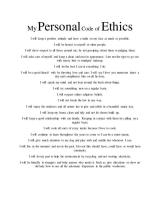What are some examples of Business Ethics?
Business ethics involve principles and standards that guide behavior in the business world. Here are some illustrative scenarios that exemplify various aspects of business ethics:
Honesty and Transparency:
- Scenario: A company discovers a flaw in one of its products that could potentially cause harm to consumers. The ethical response is for the company to disclose the issue transparently, issue a recall if necessary, and take steps to rectify the problem.
Fair Employment Practices:
- Scenario: During the hiring process, a manager avoids discriminating against candidates based on race, gender, age, or other protected characteristics. The company promotes diversity and inclusion in its workforce.
Environmental Responsibility:
- Scenario: A manufacturing company invests in eco-friendly practices and technologies to minimize its environmental impact. The company adheres to regulations and strives to reduce its carbon footprint.
Customer Privacy:
- Scenario: An e-commerce company collects customer data for transactions but ensures that personal information is securely stored and not shared without explicit consent. The company also complies with data protection laws.
Corporate Social Responsibility (CSR):
- Scenario: A large corporation allocates a portion of its profits to support local community projects, education initiatives, or environmental conservation efforts. The company actively engages in philanthropy as part of its CSR.
Anti-Corruption Practices:
- Scenario: A multinational company operating in various countries ensures that its employees and business partners adhere to anti-corruption laws. The company has clear policies against bribery and unethical practices.
Whistleblower Protection:
- Scenario: An employee witnesses unethical behavior within the company and reports it to the appropriate authorities without fear of retaliation. The company has established mechanisms to protect whistleblowers.
Supply Chain Ethics:
- Scenario: A fashion retailer conducts thorough audits of its supply chain to ensure that suppliers adhere to fair labor practices. The company avoids sourcing products from suppliers with a history of exploiting workers.
Product Safety:
- Scenario: A pharmaceutical company thoroughly tests its drugs before releasing them to the market, prioritizing patient safety over potential profits. The company promptly recalls any products found to pose health risks.
Conflict of Interest:
- Scenario: An executive at a company avoids making business decisions that could benefit a family member or friend, thereby preventing conflicts of interest. The company has clear policies addressing such situations.
Fair Pricing:
- Scenario: A retailer avoids price gouging during times of crisis or high demand, ensuring that the pricing of essential goods and services remains fair and reasonable.
Employee Well-being:
- Scenario: A tech company invests in employee well-being programs, providing benefits such as flexible work hours, mental health support, and a positive workplace culture.
Responsible Marketing:
- Scenario: An advertising agency refuses to engage in deceptive marketing practices and ensures that advertisements are truthful and not misleading to consumers.
Intellectual Property Protection:
- Scenario: A software development company respects intellectual property rights, refraining from using unauthorized software or infringing on patents held by other companies.
Financial Integrity:
- Scenario: A financial institution follows ethical accounting practices, accurately representing its financial health and avoiding fraudulent activities such as embezzlement.
These examples demonstrate the diverse aspects of business ethics and how companies can uphold ethical standards in their operations, interactions with stakeholders, and contributions to society. Business ethics play a crucial role in building trust, maintaining reputation, and fostering sustainable business practices.
Real-World Instances of Ethical Business Practices:
Patagonia: This clothing company emphasizes environmental responsibility and social justice in its business model. They source sustainable materials, use fair labor practices, and donate 1% of their sales to environmental causes. Their commitment to these values earned them a loyal customer base and positive brand image.
Ben & Jerry's: This ice cream company is known for its social activism and commitment to ethical sourcing. They advocate for various social and environmental causes, source ingredients responsibly, and promote fair trade practices. This stance resonated with conscious consumers and helped them build a strong brand identity.
Tesla: This electric car company promotes sustainable transportation and clean energy solutions. They invest heavily in research and development of electric vehicles and renewable energy technologies. Their commitment to sustainability attracts environmentally conscious consumers and positions them as a leader in the clean energy transition.
The Body Shop: This cosmetics company prioritizes ethical sourcing and cruelty-free practices. They source natural ingredients sustainably, avoid animal testing, and support various social and environmental causes. Their ethical stance resonates with customers who value sustainability and cruelty-free products.
Unilever: This multinational consumer goods company promotes sustainable practices throughout its supply chain. They set ambitious sustainability goals, invest in renewable energy sources, and strive for zero-waste production. Their commitment to sustainability attracts environmentally conscious consumers and positions them as a leader in responsible corporate practices.
Implementation and Enforcement of Business Ethics:
Companies can implement and enforce business ethics through various strategies:
- Developing a code of ethics: This document outlines the company's core values and ethical principles, providing clear guidelines for employees' conduct.
- Providing ethics training: Regularly training employees on ethical decision-making, compliance with ethical guidelines, and identifying and reporting unethical behavior.
- Establishing ethical leadership: Leaders set the tone for ethical behavior by demonstrating it themselves and holding others accountable.
- Creating a culture of ethics: Fostering an open and transparent environment where employees feel comfortable reporting unethical behavior without fear of reprisal.
- Implementing monitoring and reporting systems: Establishing systems to monitor compliance with ethical guidelines and identify potential unethical practices.
- Enforcing disciplinary measures: Implementing consequences for violations of the code of ethics to ensure accountability and discourage future misconduct.
Benefits of Strong Business Ethics:
Exemplifying strong business ethics benefits companies in several ways:
- Enhanced brand reputation: Ethical practices build trust with customers, investors, and stakeholders, leading to a positive brand image.
- Increased customer loyalty: Consumers are increasingly drawn to businesses that align with their values, leading to increased customer loyalty and retention.
- Improved employee morale and productivity: Ethical workplaces foster positive employee morale, leading to increased motivation, engagement, and productivity.
- Reduced risk of legal and regulatory issues: Companies with strong ethics are less likely to face legal or regulatory violations, saving time and resources.
- Attracting and retaining talent: Ethical companies attract talented individuals who want to work for organizations that align with their values.
- Long-term success and sustainability: Ethical practices are key to building a sustainable and successful business in the long run.
By prioritizing ethical practices, companies can create a positive impact on their employees, customers, communities, and the environment, ultimately contributing to a more just and sustainable world.
